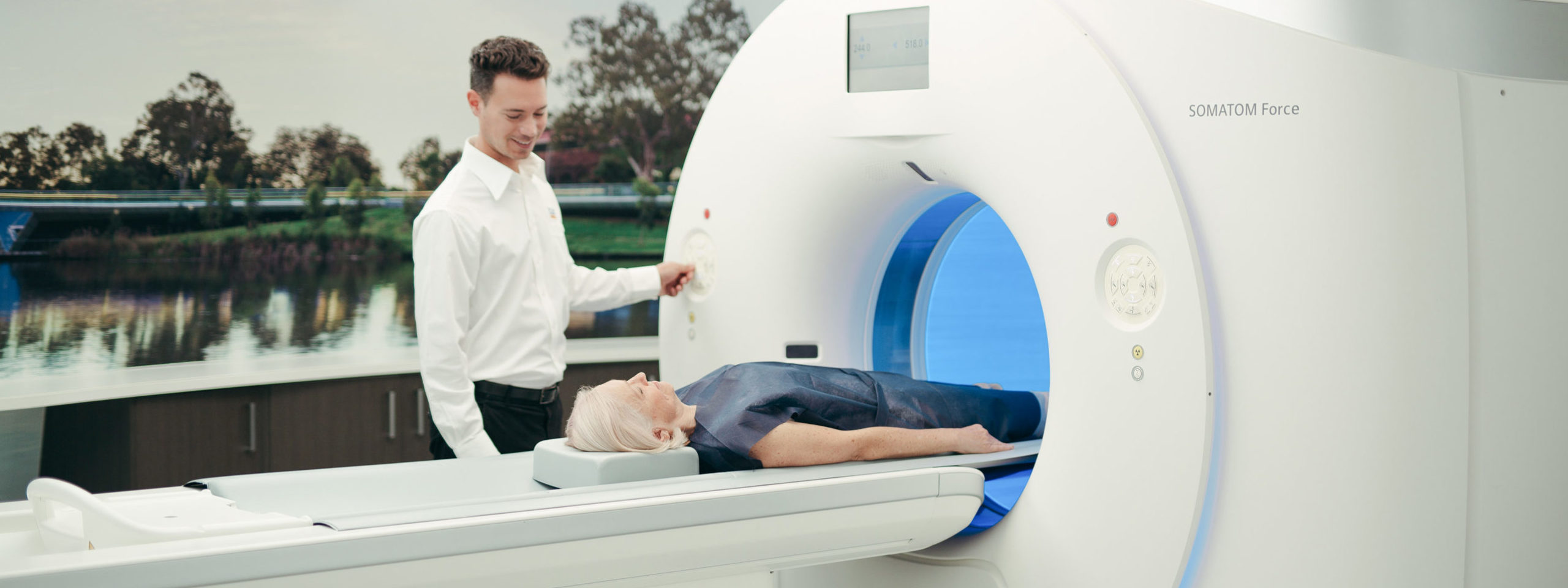A coronary angiogram looks at the arteries supplying your heart. It is a test used to show if there is plaque or severe narrowing of the arteries which may need treatment.
Procedure
A coronary angiogram procedure consists of three parts: pre-procedure observations; the CT scan; and post-procedure observations.
Pre-scan Procedures (30 – 75 minutes)
A radiology nurse will ask you questions and check your heart rate and blood pressure. You may be given medication to slow your heart rate for the scan and be required to wait one hour for the medication to start working.
A cannula (small needle) will be placed into a vein in your arm for contrast to be given during the scan. You will be asked some questions to determine if you have any known allergies or risk factors for the IV contrast. More information on IV contrast.
The CT Scan (15 – 30 minutes)
You will lie on the CT table on your back with your arms raised above your head. You will be connected to a heart monitor, and the contrast injector will be attached to the cannula in your arm. Once everything is connected and you are positioned correctly inside the scanner, the radiology nurse will spray glyceryl tri-nitrate (GTN) under your tongue to dilate your blood vessels.
During the scan, you will be asked to hold your breath for short times. Once the images are reviewed by radiographer and radiologist, you will be disconnected from the heart monitor and contrast injector and asked to take a seat in the area so staff can observe you.
Post-scan Procedures (30 minutes)
Our radiology nurse will observe you after the scan to check for side effects from the glyceryl tri-nitrate spray and contrast, and check your blood pressure and heart rate. During this time, the CT radiographer and radiologist review your scan to ensure all the information needed has been captured on the images. Once everything has been checked, your cannula will be removed and you will be able to leave.
Before your Scan
- Fasting is not required, but water (clear fluids are encouraged for hydration).
-
No nicotine products (smoking or vaping) 4 hours prior to scan.
- Withhold from taking Viagra/Cialis medications for 3 days prior to your appointment date as they are a contraindication for the GTN medication we administer during the test. These medications should be withheld only if safe to do so by your prescribing doctor.
- Take any beta blocker medications prescribed by your cardiologist for the procedure as directed.
Before the angiogram, you may be asked to change into an examination gown for your comfort, and to ensure clothing does not affect the images and diagnostic quality of the scan. You may also be asked to remove jewellery, eye-glasses and any metal objects that might interfere with the images.
Duration
The total duration of the test requires that you will need to be in the clinic for 2 – 2.5 hours.
When you make your appointment you will be given your arrival time and your scan time.
It is important that you arrive at the arrival time for pre-scan procedures and observations.
Risks / Side effects
As part of the CT, you may need to have an injection of a IV contrast . This medication is administered intravenously (injection into vein) through a needle. When the injection goes in you may have a warm feeling in the face, neck or pelvis. This usually lasts for a brief period then disappears. These feelings are normal and not an allergic reaction.
Occasionally (<1%), mild allergic reactions such as a rash, hives or sneezing can occur. These usually develop at the time of scanning, do not require treatment and settle rapidly. Sometimes a mild reaction such as a skin rash may occur from 1 hour to 1 week after injection.
Less commonly (<1 in 100,000 patients), more severe reactions can occur including asthma or shock. Severe, life threatening reactions up to and including death have occurred but are extremely rare. In the event of a reaction, we have equipment and trained staff available to begin immediate treatment.
Read more information on IV contrast.
The glyceryl tri-nitrate medication may give you an intense headache which will ease after the scan.
Cost
A fee applies for a coronary angiogram (CT), but the amount you pay depends on certain Medicare criteria. Please confirm at the time of booking.
Other Information
For bookings, please contact:
Calvary Adelaide Hospital
08 7100 7800
St Andrew’s Hospital
08 8402 4401
SAHMRI
08 8407 6750
Are you ready to make your CT (Computed Tomography) Scan appointment?
Our online booking platform allows you to quickly and easily make an appointment online.



